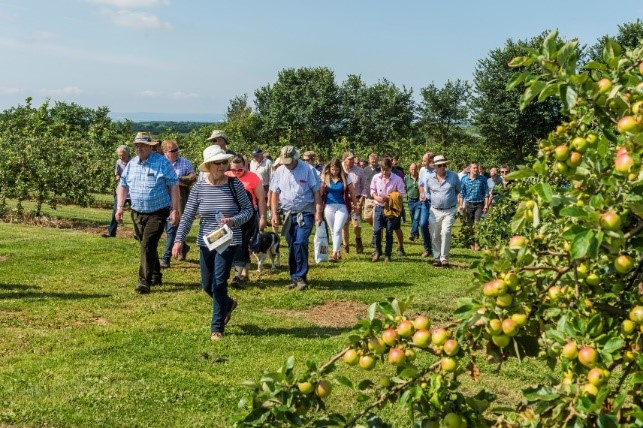
Aug 21, 2019
Orchard managers, apple growers and cidermakers from all over the country gathered on 1st August for the annual National Association of Cider Makers (NACM) Orchard and Machinery Day. This year, emphasis was on the importance of orchard management in producing the consistently high quality of fruit it needs in its cidermaking.
Hosted by Thatchers at their Shiplate orchard around 250 people from across the industry came along for the event. Gordon Johncox, NACM Chair, opened the orchard walk with an update about the cider market and NACM priorities to support a return to cider category growth. During the walk guests heard from industry experts in varying aspects of orchard management, and the importance of healthy orchards and apple production.
Advice on topics such as soil analysis and nutrition, hedgerow planting and the importance of fruit quality were shared by the Thatchers team, alongside experts including agronomist Matt Greep and cider apple expert John Worle.
Also attending the day were a number of PhD students currently taking part in the NIAB-EMR programme, supported by the NACM. Dr Louisa Robinsorn-Boyer from NIAB EMR gave an update on the importance of the joint industry PhD programme and the essential research that the students will carry out on cider apples over the course of three years.
The importance of long term research was again demonstrated by seeing the rows of newer apple varieties such as Angela, Lizzie and Prince William. These have been developed through research and innovation for many years, by the NACM and its members, extending the apple season and adding more flavour variety into the UK grown cider apple crop.
“Bringing the apple growing and cidermaking communities together in an event such as the Orchard and Machinery Day helps everyone understand the issues we as an industry are all facing – from politics, the changing market to climate change – so we can continue to make excellent products that people want to buy,” concluded Richard Johnson, quality manager at Thatchers Cider.

Richard Johnson, Chris Muntz-Torres (Thatchers), Liz Copas, Gordon Johncox (NACM Chair/CEO Aston Manor)
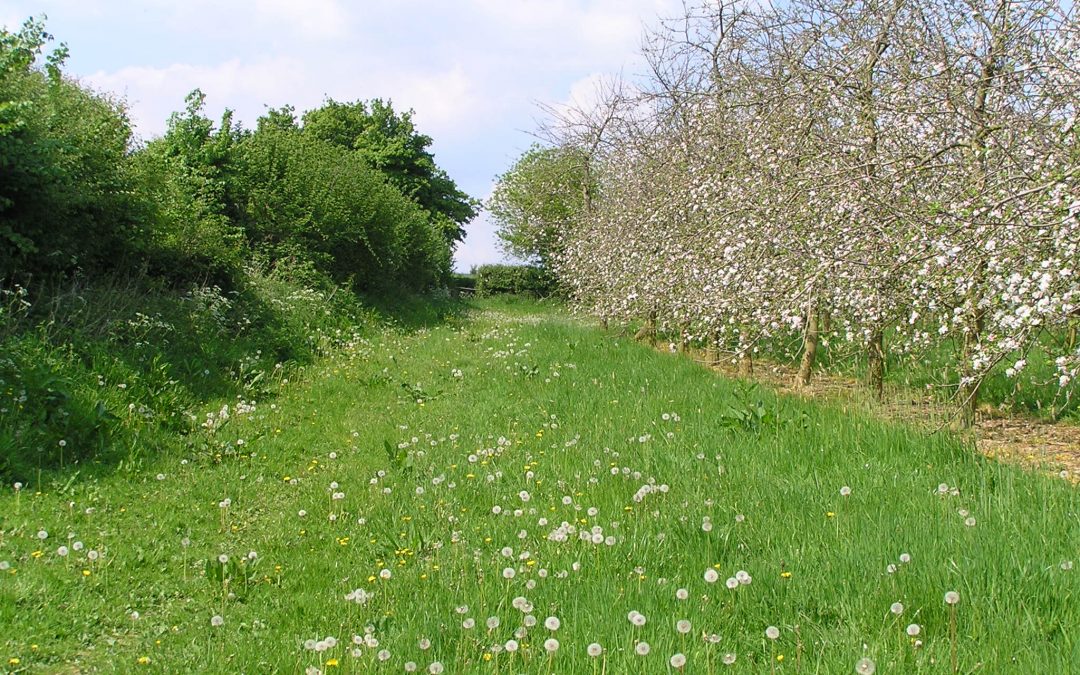
Jun 4, 2019
NERC CASE PHD STUDENT Alistair Campbell PhD, Improving pest control services
Alistair Campbell’s PhD investigated improving pest control services and beneficial insect conservation in cider apple orchards using multi-functional flower mixes and was published in 2014. The work was sponsored by Syngenta and run on Bulmers orchards and a number of conclusions were drawn:
- Mixed flower types attract a greater diversity of beneficial insects in apple orchards than mixes targeted to certain pollinators
- Some groups of beneficial insects may be affected by small changes in flower mix
- Some evidence for reduced leaf damage from increased predatory insect numbers, with no loss of yield
- Pollination can be a limiting factor for yield in cider apple orchard, with >80% of flower visits from wild pollinators
- There is a positive relationship between fruit set and solitary bees’ flower visits
- Provision of nesting sites for solitary bees would be beneficial
Further information and more details:
https://www.researchgate.net/publication/319940326_Getting_More_Power_from_Your_Flowers_Multi-Functional_Flower_Strips_Enhance_Pollinators_and_Pest_Control_Agents_in_Apple_Orchards
http://eprints.lancs.ac.uk/84000/1/Campbell_apple_ms_nov16_full.pdf

Apr 29, 2019
NACM is proud to be working with NIAB-EMR and the other partners to sponsor BBSRC CTP PhD students who are conducting cider apple relevant research as a part of their PhD. Over a series of features we will introduce you to each student and the topic that they are researching. To begin with, we look at an overview of the programme and how it will help to contribute to a secure and sustainable future for cider apple growing. For more information please contact us.
Magda, who is from Andalucía and who grew up on an orange and olive farm, has a BSc in Biology and a MSc in Biotechnology and Genetics through which she has gained extensive background knowledge in genetics. In 2014 she started working at NIAB-EMR as a research technician and during this time participated in several research projects in a multidisciplinary team.
Rootstocks are an essential component for successful tree fruit production, yet the below ground root systems are little understood. Her research will aim to identify the genetic basis of root system architecture in apple rootstocks and to associate root type with nutrient and water use efficiencies, and also anchorage in this woody perennial species. This research will contribute to the generation of new and improved rootstocks and could have significant potential impact for other high value perennial crops.
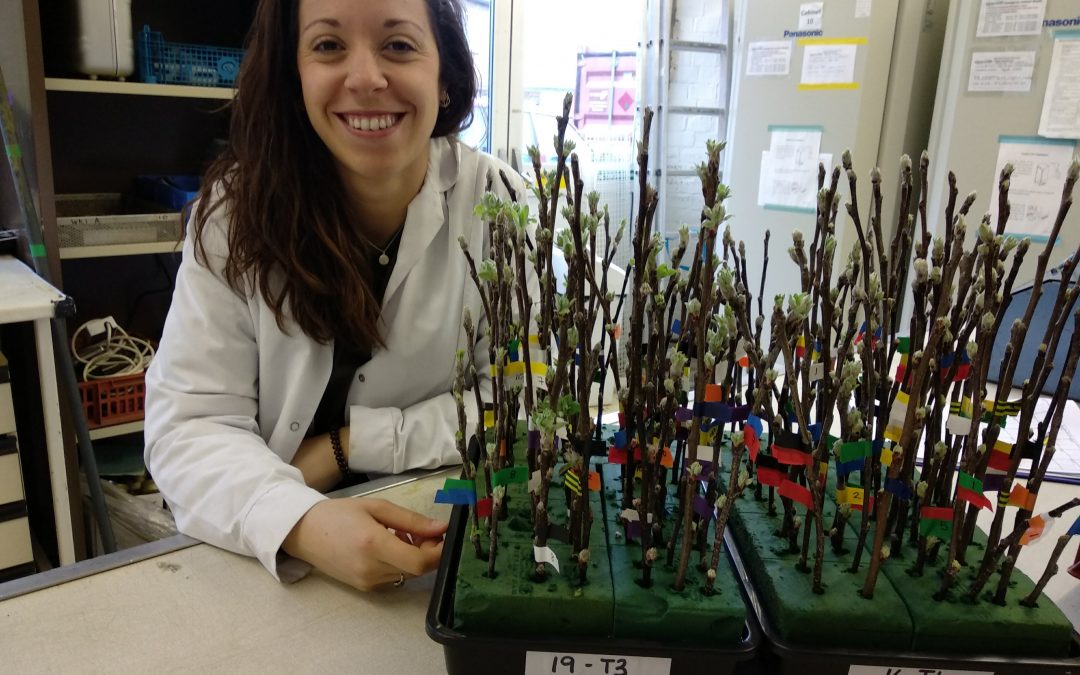
Apr 29, 2019
NACM is proud to be working with NIAB-EMR and the other partners to sponsor BBSRC CTP PhD students who are conducting cider apple relevant research as a part of their PhD. Over a series of features we will introduce you to each student and the topic that they are researching. To begin with, we look at an overview of the programme and how it will help to contribute to a secure and sustainable future for cider apple growing. For more information please contact us.

Carlota is doing a PhD with NIAB-EMR and the University of Reading. She studied in Environmental Sciences at the Universitat de Girona (Spain), the region of Spain she is from, and has a Post-Graduate Diploma in Conservation of Biodiversity from the University of Kent. After university, she worked in the forestry sector for two years, focusing on seed dormancy and germination.
Her PhD is “Understanding the mechanisms of apple dormancy break in the context of climate change”. In the UK, climate change projections predict an increase in temperatures and in the frequency of extreme weather events. For apple production, this translates into a longer growing season with higher chances of frost due to early flowering and a shorter and potentially insufficient chilling period. Insufficient chilling can contribute to the absence or delay of bud break and the production of smaller and abnormal fruits, having a huge impact on apple production. A modelling approach is required to anticipate climate change impacts on dormancy break. The overall goal of this PhD is to develop a new chilling model for apple, which will be used to advice growing ractices and guarantee future apple production in the UK.
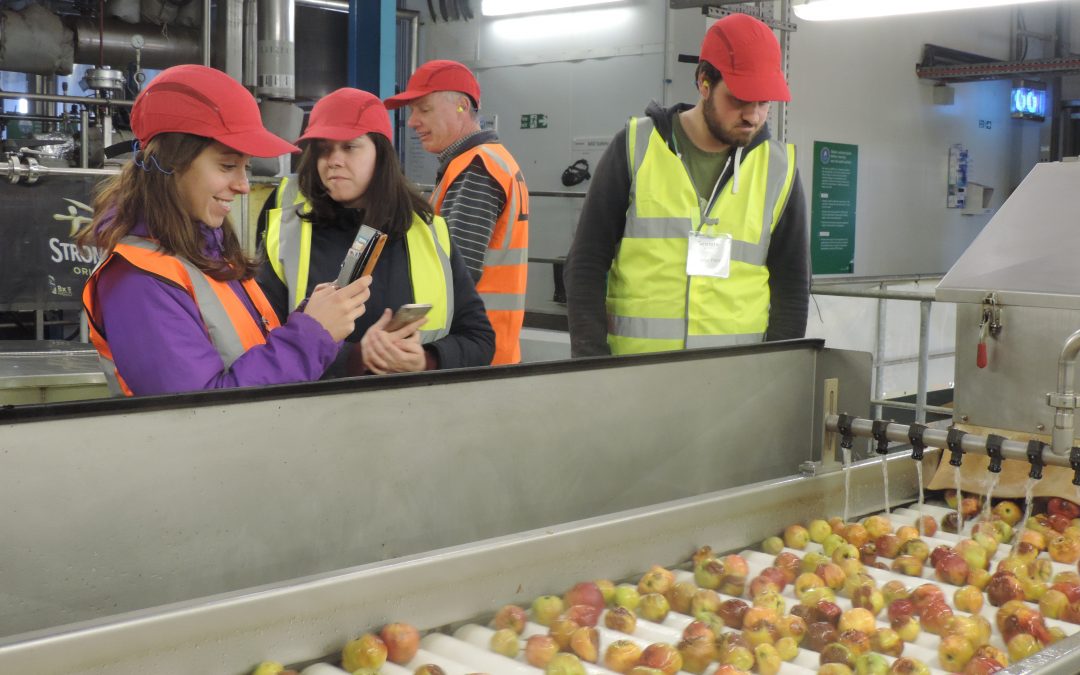
Apr 11, 2019
NACM is proud to be working with NIAB-EMR and the other partners to sponsor BBSRC CTP PhD students who are conducting cider apple relevant research as a part of their PhD. Over a series of features we will introduce you to each student and the topic that they are researching. To begin with, we look at an overview of the programme and how it will help to contribute to a secure and sustainable future for cider apple growing. For more information please contact us.
NACM was first approached in 2016 to join in with a multi company approach to funding a PhD research programme focussed around top fruit trees. The FCR-CTP programme started in 2017 and covers not just tree fruit crops but also soft fruit and is the largest research programme of its kind in the UK with topics ranging from the cider apple relevant ones listed below, but also including robotic strawberry picking, managing spotted-wing drosophila in cherries and strawberries and many others. Part of the intention is the interaction between students of different disciples and different years to create synergies in thinking and ultimately application. Each PhD topic is considered for this: e.g. whilst the PhD ion root architecture is focussed on apple rootstocks, the lessons learned will also be applicable to perry pears (and plum, and cherries etc.) The students themselves are from varied background and nationalities and bring fresh pairs of eyes to cider apple research.
The programme started in 2017 and NACM was pleased 3 students selected cider relevant PhD topics. Each year the NACM Pomology Committee is provided with a list of topics that academics and the industry partners have proposed can select ones that would most relevant to cider apple growers. Chosen topics in the first three years are:
- 2017 cohort
- Winter dormancy mechanisms
- Woolly apple aphids, parasitic wasps and climate change
- Root architecture (ref. anchorage, water, nutrient uptake)
- 2018 cohort
- Novel ways of managing tree crop fungal diseases using precision diagnostic technologies to tailor disease management strategies
- Investigating inherent resistance to crown rot in apple (and strawberry)
- Understanding soil resilience to improve tree health
- 2019
- Resistance and susceptibility in interactions between apple and woolly aphids
- How does nutritional status affect plant immunity?
- Carbon sequestration potential of apple rootstocks: the role of root recalcitrance, root exudates, and the rhizosphere microbiome
Each student will spend four years conducting the research and will present a final thesis to support their PhD. During the course of their PhDs the students will complete a number of reports and also typically publish 2-3 academic papers. NACM will maintain a library of these reports, and also encourage the students to present at NACM events such as the annual Growers Walk and Biennial Growers Conference.
The 2017 cohort celebrated their first year with a trip to Herefordshire to learn more about cider making and to enjoy an evening sampling a range of ciders as well as trying some food matching. The trip included a visit to a range of Westons’ orchards, and a tour of the site which was then followed by a visit to Heineken’s apple mill in Ledbury. More field trips will be arranged as the PhDs progress.
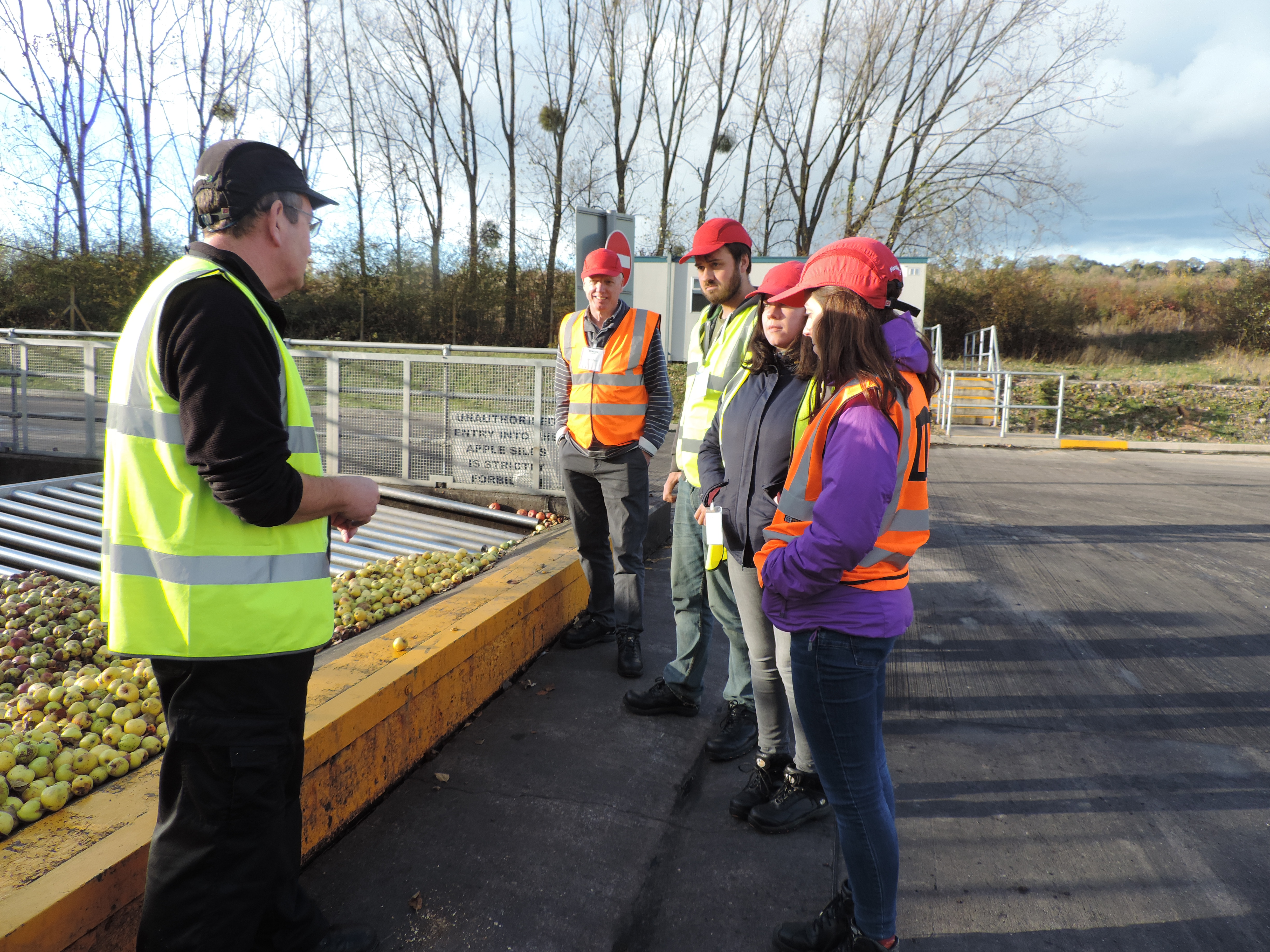
During their first year they spend time familiarising themselves with their research topic and conduction preliminary experiments to understand the issues they may face e.g. tree samples dying, not being able to get woolly aphids to breed in the laboratory. The 2018 cohort is just starting that phase having begun their work in October 2018 and we are busy recruiting students for the 2019 selected topic.
For more information about the BBSRC Fruit Crop Research CTP please see http://www.ctp-fcr.org/
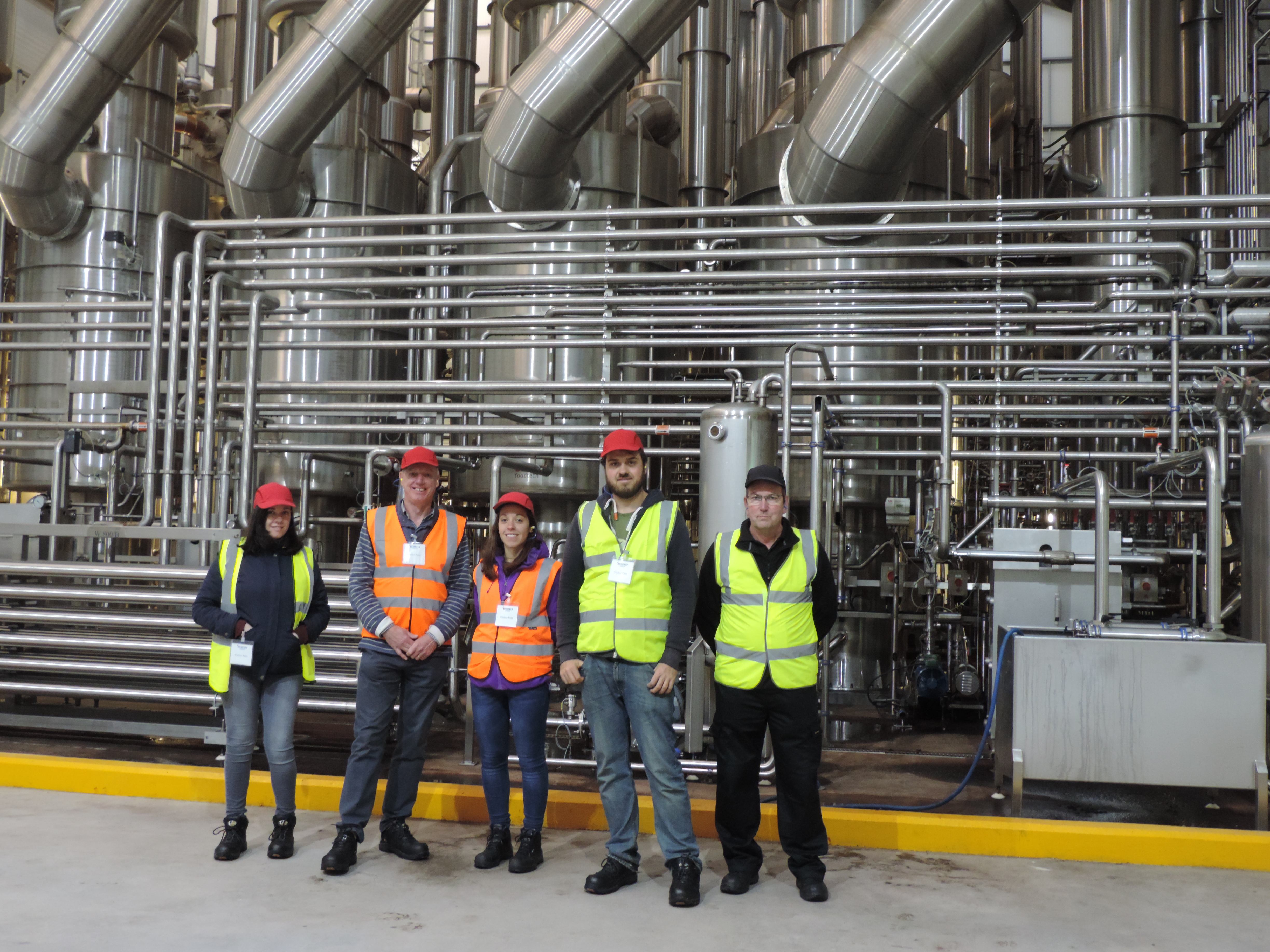

Apr 5, 2019
UK NERC funding has enabled an industrial partnership to investigate how microbial diversity in soil affects apple production. It is an important collaboration between cider and beer business Heineken, partner trade body the National Association of Cider Makers, and researchers in the University of Sheffield’s Department of Animal and Plant Sciences, led by Dr Duncan Cameron and Dr Karl Evans.
Find out more here










